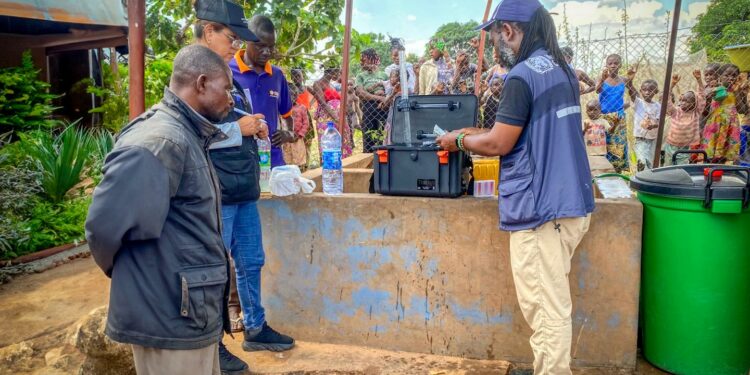In the heart of the Boa Vista neighborhood in Luanda, Angola, a story of resilience and solidarity is palpable. When the first cholera cases appeared in her neighborhood in January 2025, Maria Teresa did not hesitate to join a group of women committed to the health and well-being of their neighbors.
Driven by a deep sense of community, these women not only distributed hygiene products but also became active agents of change, educating and encouraging their neighbors to adopt preventive practices. “We live in a community, and it is our responsibility to protect each other to save lives,” says Maria Teresa, reflecting the collaborative spirit that has driven the local response.
The impact of this social mobilization is tangible. For four consecutive weeks, Boa Vista has reported no new cholera cases — a significant achievement in a context marked by socioeconomic vulnerability. Mika Kaquesse, the municipal administrator of Ingombota, highlights that the key was breaking down barriers of misinformation and distrust that initially prevented many families from seeking medical care.
Kenya: a business blossoming from the soil
Coordination between local authorities, international organizations, and the community itself led to 800 awareness sessions, the construction of basic infrastructure such as water tanks, and ongoing campaigns spreading clear messages about the importance of clean water, sanitation, and hygiene.
Dr. Genoveva Mafu, clinical coordinator of the cholera treatment center in Boa Vista, acknowledges that the joint work between health professionals and community leaders was decisive in controlling the crisis. “At first it was frightening, but collective effort and solidarity made the difference,” she says.
This social movement expanded nationwide, with more than 8,000 community mobilizers trained and nearly 4,500 community leaders educated in early detection and basic treatments such as preparing oral rehydration solutions. The alliance between sectors — including environment, fisheries, youth, and the armed forces — ensured a coordinated and culturally appropriate response, resulting in over 8 million people receiving crucial cholera prevention information.
For Mateus Mariano Miguel, president of the Boa Vista Residents’ Committee, the real strength has been renewed trust in health services and the emerging sense of shared responsibility. “The community responded massively, and we continue working because we know prevention must never stop, even when there are no new cases,” he assures.
Additionally, the health system strengthened its capacity by training 1,000 healthcare workers and activating nearly 140 surveillance teams for case management and active detection, while 166 rapid response teams and 180 treatment centers were deployed nationwide. Although the outbreak has claimed nearly 750 lives and affected more than 26,000 people, the steady decline in new cases and deaths since the beginning of the year reflects the positive impact of a social and multisectoral approach that has empowered communities to take a leading role in defending their health.
Dr. Indrajit Hazarika, WHO Representative in Angola, emphasizes that “when communities are empowered and actively involved, not only lives are saved, but dignity is restored.” In Boa Vista, that dignity and hope shine stronger than ever today









